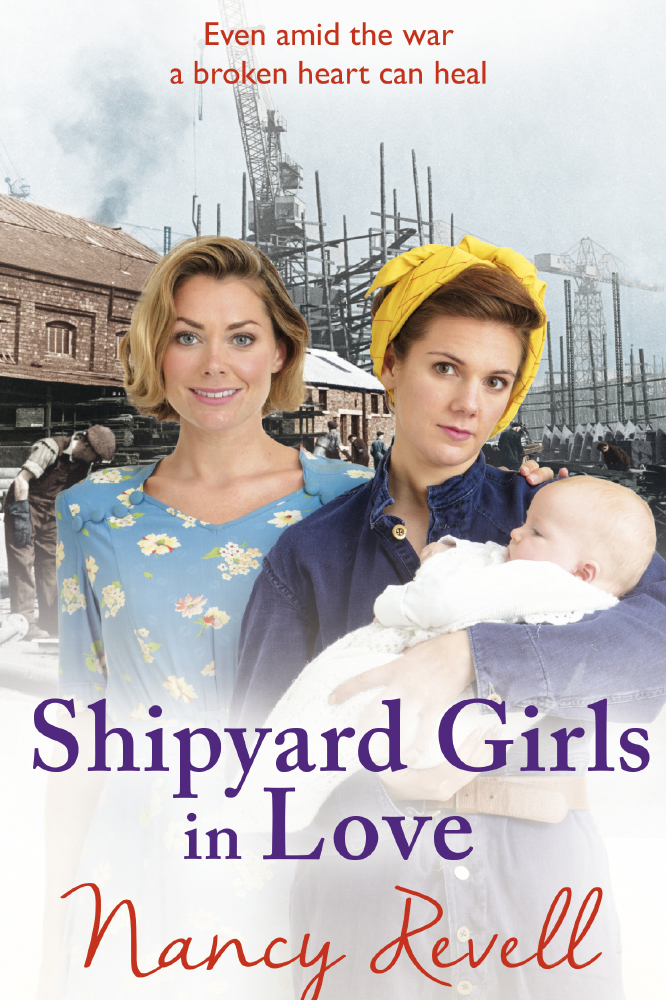Sunday Times bestselling author Nancy Revell talks about her experiences of writing a wartime novel during the present Covid-crisis.

A Christmas Wish for the Shipyard Girls
During the five years I have been writing The Shipyard Girls series, I’m often struck by how much society has changed – and also how little. How we have taken great steps forward, but also in many ways, we haven’t moved on at all. Of course, sometimes my perception depends on how positive – or negative – I’m feeling at that moment in time!
Whilst working through edits of my latest novel A Christmas Wish for the Shipyard Girls during lockdown, I had a particularly strong sense of parallel between wartime Britain and living through the present day pandemic. The hardships people were facing, being separated from loved ones, being worried about family and friends. Also, a feeling of not being in control or not knowing what was around the corner. But at the same time, a feeling of pulling together, people supporting each other, sharing, being selfless rather than selfish.
The community spirit, which is often referenced when talking or writing about both World Wars, seemed to have a resurgence during those first weeks and months of the Covid-19 crisis. The zeitgeist of wartime Britain suddenly felt here – in the present day. People helping those in need, both practically and emotionally. Society was drawing close to cope with the new terrifying, topsy-turvy world in which we had all suddenly found ourselves.
RELATED: 10 Things I'd like my readers to know about me by Nancy Revell
The similarities seemed particularly poignant as the underlying theme of book eight, Triumph of the Shipyard Girls, published as we went into lockdown, was that of overcoming adversity. It’s a common thread in all the books but in this one it’s particularly prevalent. The epigraph at the start of the book is a quote from Corinthians. ‘We are troubled on every side, yet not distressed; we are perplexed, but not in despair; Persecuted, but not forsaken; cast down, but not destroyed.’ Reading it afresh sent a shiver down my spine and I made a resolution to try to be optimistic and resilient and help those I could. I found myself taking inspiration from the real shipyard women I write about. For research I listen to recordings of interviews with these women who worked in the north east shipyards during WW2 and I was struck by their inner strength – as well as their humour. The shipyards were a key target for Hitler’s bombers, and they carried on in spite of the danger, the fear and the very real hardships they faced at work and home. They inspired me to emulate their courage, as well as their humanity.
During the first part of the latest book, A Christmas Wish for the Shipyard Girls there is a scene which describes how the town comes together after a particularly heavy air raid. My editor wrote in the margin, ‘This sort of community spirit feels so strangely relevant to our world now too.’ And I had to agree. It really did.
Since coming out of lockdown – and more so now we are being hit by this second wave, I have noticed a slight change in this sense of pulling together for the greater good. We seem more fractious than friendly, angrier than amenable.
At the end of A Christmas Wish for the Shipyard Girls there is a scene when everyone is stood out in the street on Christmas Day singing Good King Wenceslas. To me that carol is about the gift of giving and coming to the aid of those less fortunate than ourselves.
Hopefully, with Christmas around the corner, that community spirit will surge to the fore once more as we enter the season of cheer, charity and good will to all. Wishing you all a very Happy and Healthy Christmas!
RELATED: How journalism helped me to become a novelist by Nancy Revell
In the space of just a few weeks I went from knocking on strangers’ doors, chasing exclusive stories, turning copy around at break-neck speed, and trying not to go over the usual 1,200 word count, to suddenly being commissioned by a major publishing house to write 100,000 words of pure fiction to be delivered in six months... to read more click HERE


